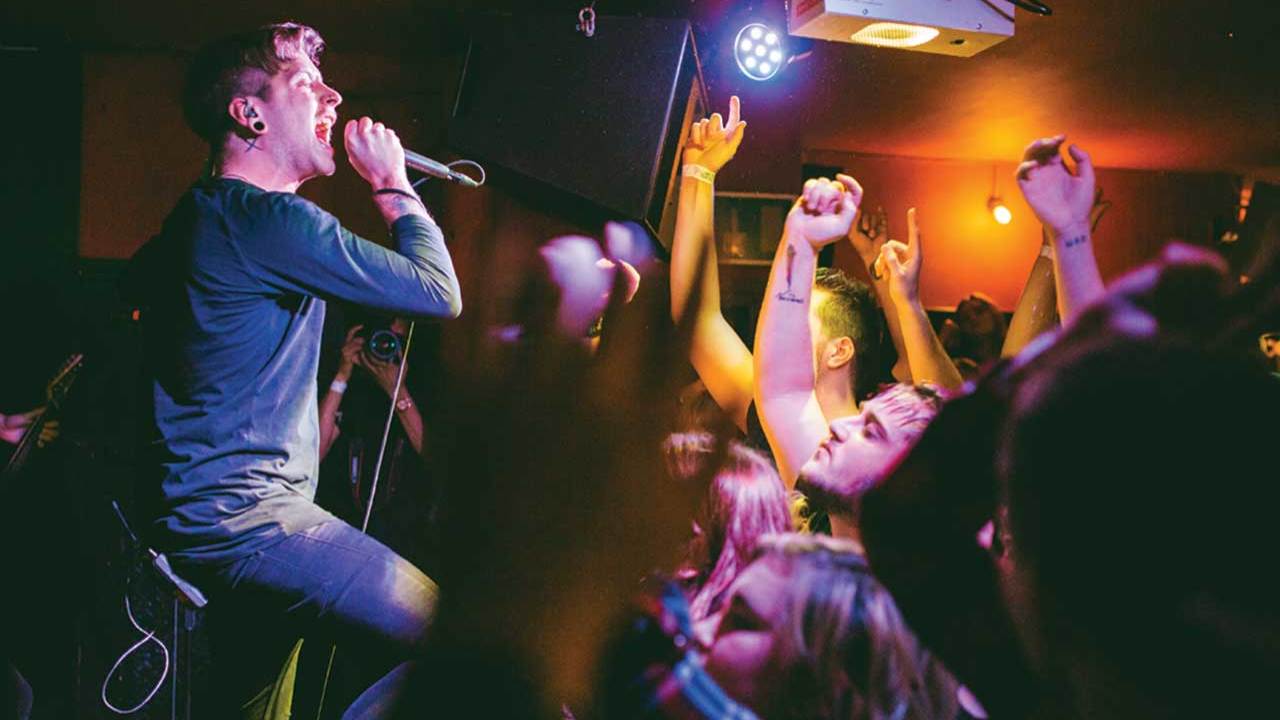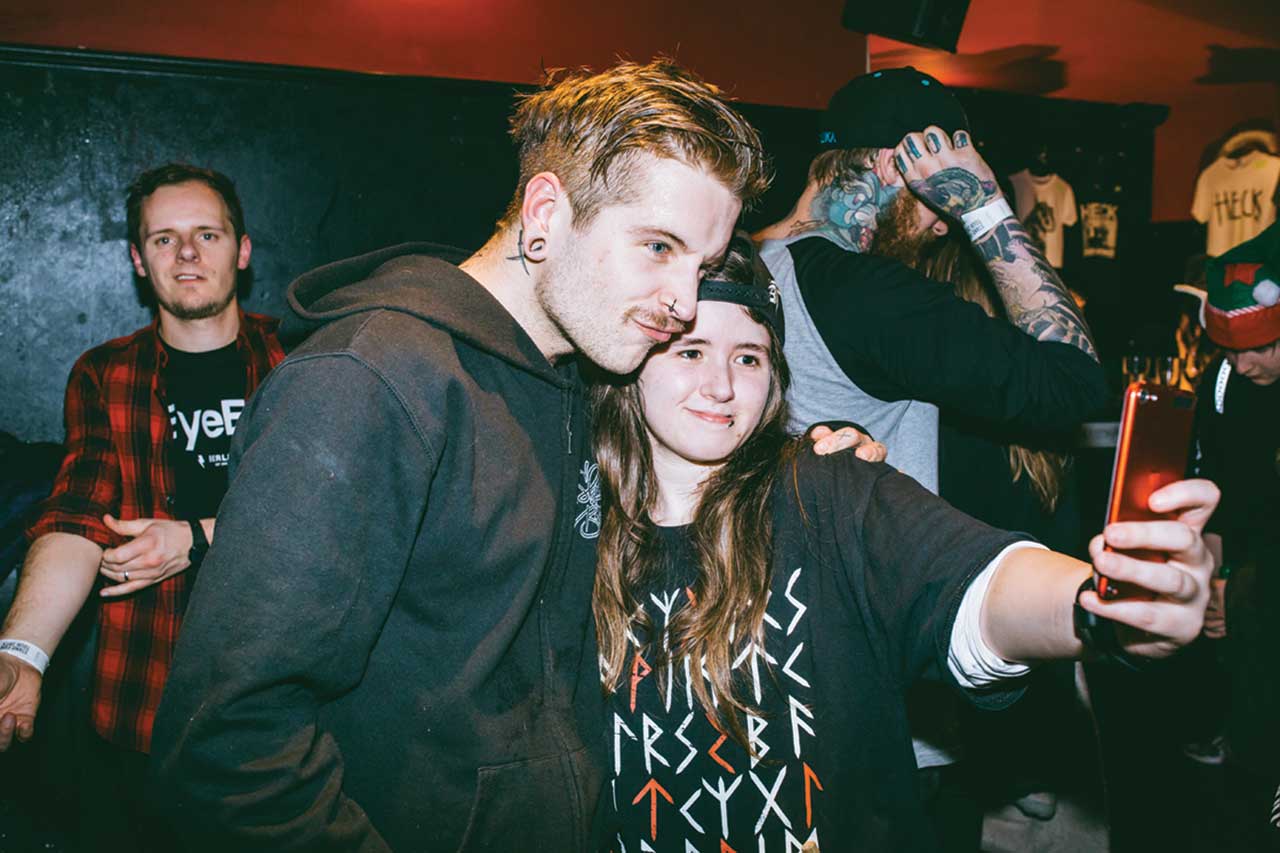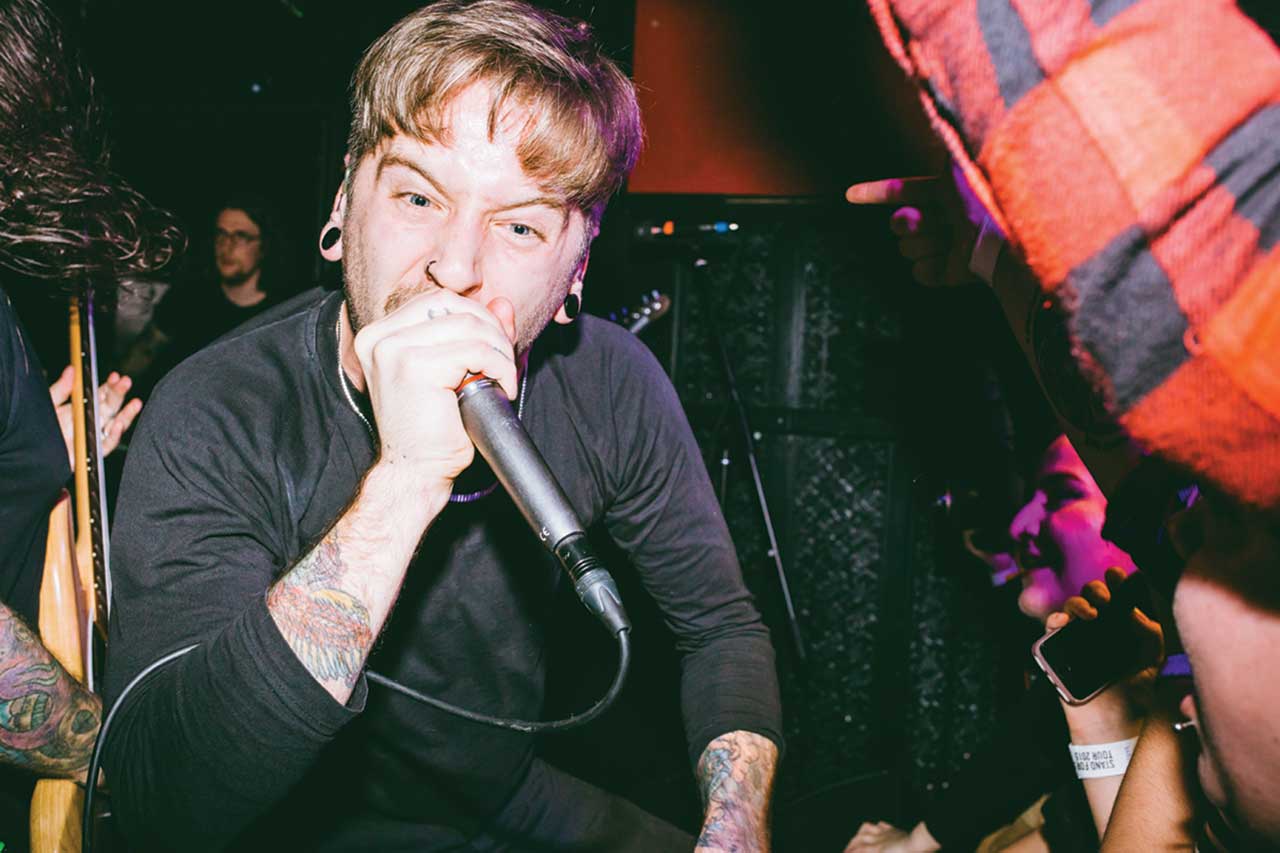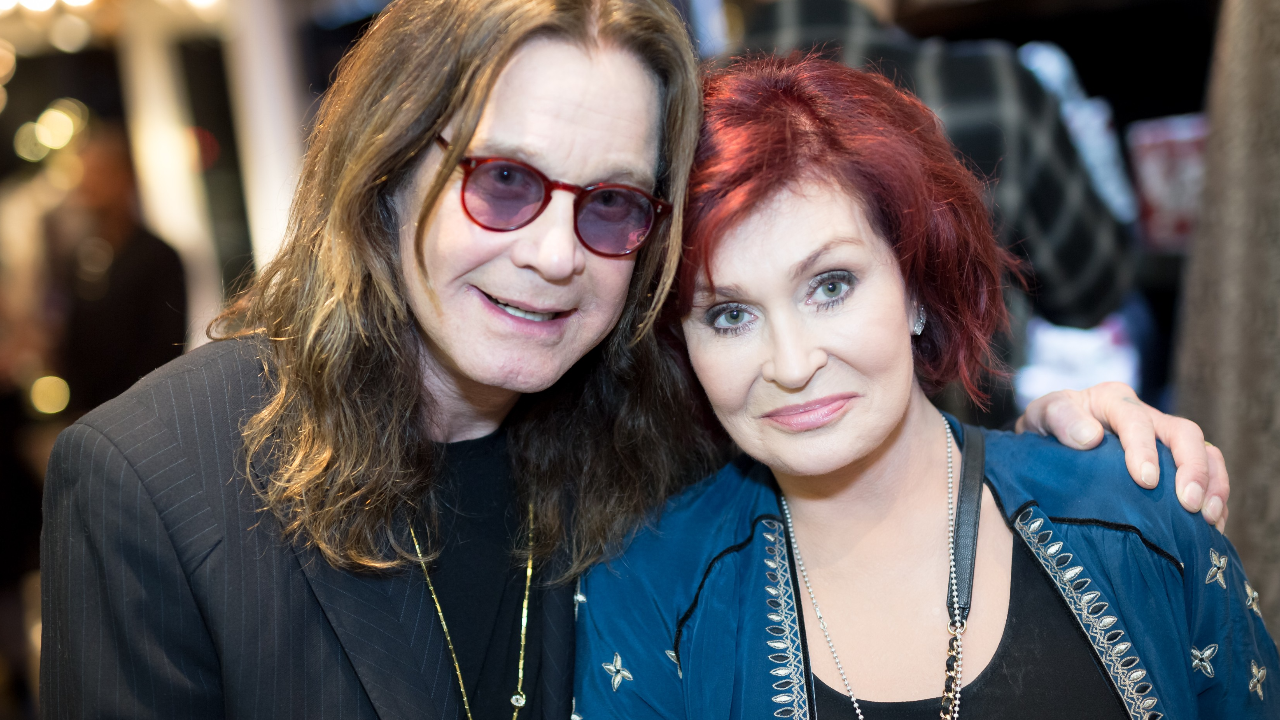How Bury Tomorrow saved my life
Growing up, Dani Winter-Bates struggled with his self-image and battled anorexia. It was Bury Tomorrow that would make him who he is today, commanding stages and helping others

When Dani Winter-Bates is in full flow with Bury Tomorrow at Camden’s tiny Black Heart, his eyes bulge out of his face. He stares down the people in front of him, confronting them yet connecting with them while summoning guttural vocals from somewhere deep inside. When he issues a command for a circle pit or a four-way wall of death, people instantly collide in a sweaty mess of limbs and hair. He stands at 5’ 11’’, but might as well be 10 feet tall.
“Now is not the time to fuck about,” he barks, throwing his arms out. “Tear this fucker down!”
But he wasn’t always like this. He was once a shy, introverted child who was uncomfortable in social situations and acted out at school. In his past, he has faced problems including obsessive thoughts and an eating disorder – the kind of problems that have made him who he is today.
“I was lucky enough to control it to a point where I wasn’t too far gone. I was absolutely fine from it, but it’s still something you have a mindset about,” he confesses.
We’re talking to Dani after Bury Tomorrow’s last show of 2015. Next they’ll release their fourth album, Earthbound, before touring with Parkway Drive. With his tight t-shirts and heavily tattooed arms, he looks like a typical scenester, but there’s much more to him. Offstage, he is polite and thinks out loud as he speaks, sometimes apologising for rambling. Today, we are talking about how he became a frontman. And, more importantly, about how Bury Tomorrow were his salvation.
Dani had a stable, if itinerant, childhood. He was born in Halifax, West Yorkshire, in 1990, before his parents’ jobs with Coca-Cola took the family to Abu Dhabi. They returned to the UK when he was four years old and settled in Southampton, where his dad worked as a salesman and his mum trained to be a nurse. He says he was an “angel” at home, but naughty at school. In Year Two, he stole a teacher’s car keys because she “pissed him off”. By Year Four, he was constantly “mouthy” and on hourly report.
At high school, Dani was put in isolation for dyeing his hair blue-black, a typical decision for any self-respecting alternative teenager of the MySpace generation. Then there was the time in Year 11 when he and a friend turned off the power to a whole block, though were never caught. Dani says that school never really agreed with him – that he found it difficult to respect authority.
Sign up below to get the latest from Metal Hammer, plus exclusive special offers, direct to your inbox!
“I didn’t enjoy being told what to do,” he explains. “And then going into secondary school I didn’t enjoy having pressure put on you like an adult, but not being treated like an adult. People who weren’t my parents acting like my parents – I recognised that right away.”
Matters weren’t helped by the fact Dani was an introverted child. He kept his head down and worked hard. “You get those kids that just go unheard and unnoticed,” he says. “You just drift through school.” He was that drifter. But the drifting turned into a bigger problem when he became unhappy with his appearance. He’d started having obsessive thoughts, looking in the mirror and feeling unsatisfied with what he saw. By the age of 14, he had developed anorexia.
Being in a band helped by confidence no end
He recounts this time of his life in a matter- of-fact way, not pitying himself but not trivialising the disorder, either. At school, he got into drumming, and would visit the practice room every lunch time and again in the evening, to drum, and drum, and drum – an obsession he recognises now as feeding his condition. It all happened gradually, creeping up on Dani, rather than being triggered by any sort of event.
“I don’t think there was anything cataclysmic that happened, but it was more just a general wanting to better yourself when there’s nothing wrong,” he explains. “I think that is the nature of body dysmorphia. And obviously I’ve got an addictive personality anyway – you only have to look at my tattoos and the tunnels in my ears. I obviously had that in me, but it was a determination of something that was quite bad as well.”

As a nurse, Dani’s mum noticed the signs right away and offered support, but outside the family he kept his struggle private. He didn’t have medical treatment, but realised he needed to make some changes in his life. “I hadn’t gone that far, luckily. I hadn’t gone through the stage of being hospitalised, or going to the GPs. I just knew I was doing something in a bad way, and tried to sort it out,” he says. “Being a realistic person is counter to obsessiveness. It’s like, if you are black and white, and realistic, then you know this isn’t helping you, and it’s not working out. So it’s almost like you’ve got these two things that are overriding, fighting.”
For Dani, “sorting it out” involved turning to music. At school, he was influenced by seeing Papa Roach frontman Jacoby Shaddix – Coby Dick back then – singing the likes of Last Resort and Broken Home while nu metal was at its peak. He was a drummer, and then the frontman in a goth-punk band.
“I really did like Papa Roach a lot,” he says, a touch self-consciously. “That band gave me my confidence. I looked at Jacoby and went, ‘I wanna be that guy, I wanna be the frontman, I wanna act like he does.’ By masking myself, I could overcome my unconfident nature.”
When Dani was 16, his older brother Davyd tried out as the bassist for budding local band Bury Tomorrow. When Davyd made the cut, he invited his younger brother to audition, too. Dani joined as keyboard player and second vocalist, eventually becoming frontman. Taking cues from his inspiration Jacoby, and sporting a black mohawk inspired by Brandan Schieppati from Bleeding Through, he began to come out of his shell. This was Dani’s turning point. He began to win his fight with anorexia. “Being in a band helped my confidence no end – I became a confident person. That expression that you can do what you want to do,” he explains.
Aside from his newfound self-possession onstage, and the strong sense of achievement that came with it, Dani is candid about the feeling of buoyancy he got from the admiration of others, and still does. His peers in college were impressed by Bury Tomorrow touring Europe; now they’re impressed to see them playing the Main Stage at Download. For Dani, it’s validation of what he’s done.
“Being a frontman is something that you have to learn,” Dani says. “People can be amazing vocalists and have God-given talents, but for me it was hard work. It was me manipulating and moulding myself into something I respected, not just everyone else. Once you do that and once you break that mould, it’s always just a nice compliment that people are giving you, saying you are good. You should be confident in yourself, but that’s the world we live in. I hate people who say, ‘I don’t do it for people’s validation.’ Well, you do, everyone does, or you wouldn’t be in a public forum being in a band.”
Today, Dani has largely put his troubles behind him. He’s done some modelling for friends, but feels a hint of frustration about the lasting effects of anorexia on his height. “There’s thoughts that I stunted my growth spurt because of not eating, not having enough nutrients,” he explains. “Now you’d just go back and slap the little kid, and be like, ‘Come on, dude. When you’re older, you’re gonna want to be 6’ 2’’, or 6’ 3’’. This is going to mess up your life.’”
I get some brutal letters from our fans
But his problems have also given him more empathy for others than many of his peers have. He’s keen to remove the distance between rockstar and audience by voicing his disdain for paid-for meet-and-greets, and encouraging fans to come and chat with him after the show. He recognises the importance of offering non-judgemental support, and on occasion he’ll step into a quiet place with someone who needs to unload.
“Sometimes we’ll go somewhere private, and they’ll talk about their feelings and what they’re going through,” he offers, while stressing that he’s not a professional counsellor. “There are some emotional things. There are some brutal letters that I get given. But I think it would be a lot worse if I was putting myself on a pedestal as this person they could never talk to and reach, because that’s when you get the things like last-cut razor blades sent to you. And it happens – I’ve got friends in massive bands who experience that. I try to reply to messages; I try to have a chat.”
He’s aware that anorexia isn’t always perceived as a condition that affects men, and uses his platform as a frontman to reassure people that eating disorders and other mental health issues are nothing to be ashamed of. “I put out a Tweet recently to say, ‘It’s OK, you can actually tell people about it, and no one’s going to look at you,’” he says. “I do think men have a hard time with it as well – it’s not talked about very much. Talking about it is the best therapy. It releases a burden.”

These days, Dani is assured on the stage and when meeting people, though he’s still uneasy in some social situations. He admits that he still thinks about food, too. “I don’t think you’ll ever lose that. I think there will always be a niggling thing in the back of your head that will say, ‘You don’t want to eat that, because that’s high in calories, or that’s fatty,’” he says plainly. “I’m a lot better; I do a lot of exercise so I offset my mindset.”
What he has been through has defined him, and Bury Tomorrow, but he’s overcome his problems and taken control of his life. At 26, he feels older, wiser and more prepared to deal with whatever comes his way. And he’s not embarrassed about what he’s been through – it’s all part of who he is.
“I hate to be a bleater, and that’s why I don’t talk about it,” he says, with typical rationality. “Everyone goes through something. It may hit them when they’re 40 and go through a midlife crisis, or it may hit them really young. I’m quite a thick-set guy, and for me it was fighting against that. That’s the hardest point. You have to come to the realisation that you’re just given what you’re given.”
With Teeth
**Beartooth’s Caleb Shomo helped Bury Tomorrow add a little more bite to their new record
**
How did you end up working on Earthbound?
“We were on tour sharing a bus, and Bury Tomorrow were writing, and I’d sit in on it to see what they were doing, giving a few tips and lending my ear. I mixed and mastered it as well. I think it’s a great record.”
What did you add to the album?
“Riffs more than anything. There were some songs with some super heavy riffs on them, and I sat with [guitarist Kristan] Dawson to get them out right. And a couple of little things like, ‘Go into this drumbeat here…’ We only did it on the bus a couple of times, but I think – I hope – I helped. I was stoked when I got the stems through as well, because Dani is a great vocalist and he crushed on this record. Jason [Cameron, clean vocals/guitars] did too, but I was like ‘YES DANI!’”
Didn’t Bury Tomorrow introduce you to your wife?
“Yeah, they opened up a tour with my old band [Attack Attack!], and that’s how I met her. The guys and I have stayed good friends. My wife is from Southampton, so I spend a good amount of time in the UK and I always try and hook up with them.”
For information and support on eating disorders, visit b-eat.co.uk. Bury Tomorrow’s Earthbound is out on January 29 via Nuclear Blast

Eleanor was promoted to the role of Editor at Metal Hammer magazine after over seven years with the company, having previously served as Deputy Editor and Features Editor. Prior to joining Metal Hammer, El spent three years as Production Editor at Kerrang! and four years as Production Editor and Deputy Editor at Bizarre. She has also written for the likes of Classic Rock, Prog, Rock Sound and Visit London amongst others, and was a regular presenter on the Metal Hammer Podcast.
